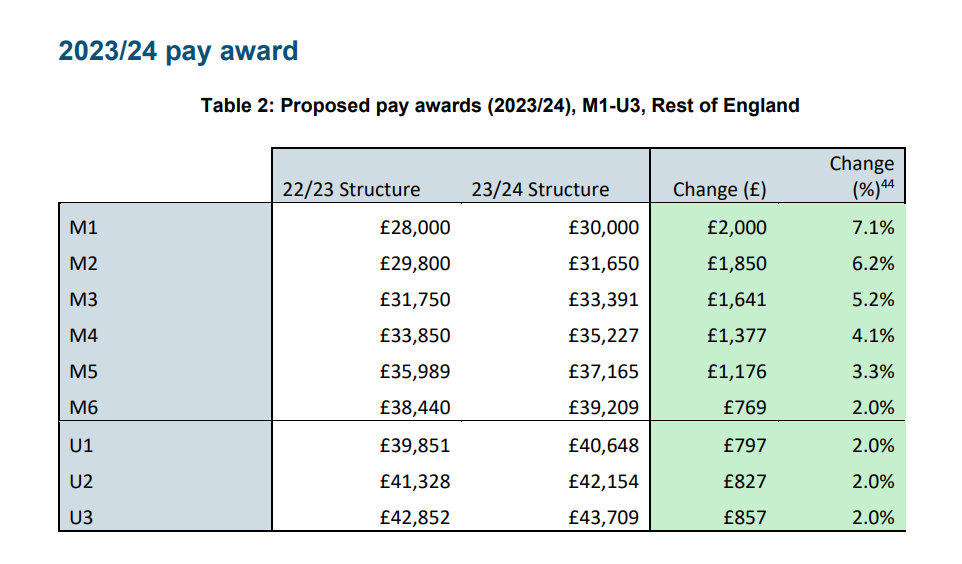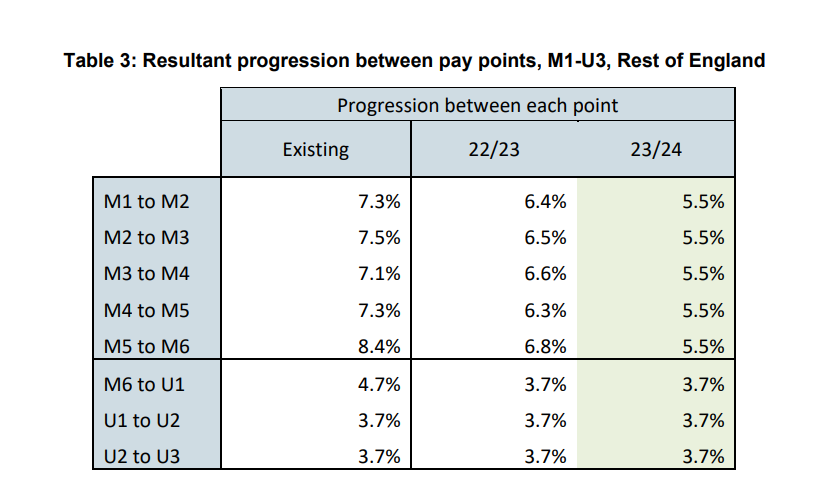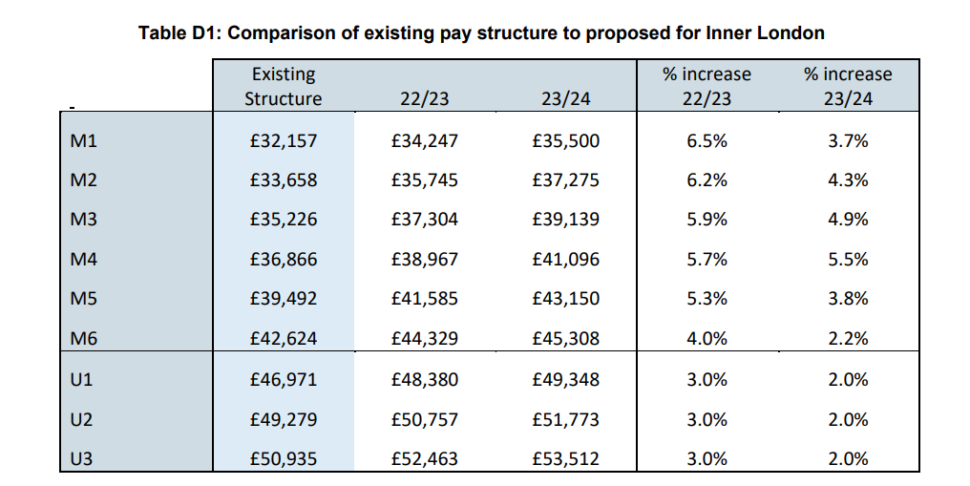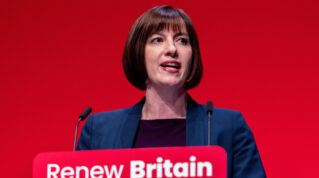The Department for Education has proposed raising teachers’ minimum pay in most of England by more than 16 per cent over the next two years to reach its ambition of a £30,000 starting salary by 2023.
But most teachers and leaders would receive smaller pay rises of 3 per cent next year and 2 per cent the year after under the proposals, and rises for teachers moving between pay points would decrease in a move to a “flatter” pay progression structure.
The DfE has published its evidence to the School Teachers’ Review Body, which makes recommendations on teacher pay. The STRB can make different recommendations to those proposed by the government, but ministers get final sign-off.
The Conservatives pledged to raise starting salaries to £30,000 in 2019, though the pledge was pushed back by the pay freeze for most public sector workers in 2021.
Last year, education secretary Nadhim Zahawi asked the STRB to make recommendations for the next two years to support the move towards the pledge.
Minimum pay to rise by over £4k
In its evidence, the DfE said it was proposing an 8.9 per cent increase to the statutory minimum (M1) pay point for qualified teachers outside London in 2022-23, followed by a 7.1 per cent increase in 2023-24.
This would mean starting salaries would increase from £25,714 this year to £28,000 in 2022-23 and to £30,000 in 2023-24, a total rise of 16.7 per cent over the two years.
There would also be increases in the other main scale points, though these become less generous the further you move up the scale.

At the same time, the progression between pay points outside London would decrease to 5.5 per cent across the main pay range. At the moment, progression ranges from 7.1 per cent between points M3 and M4, to 8.4 per cent between points M5 and M6.

But smaller rises in London
Increases in starting salaries would be smaller in London, because pay structures in the capital “already better align with the aims of our reforms”.
In inner-London, the DfE’s model would see the M1 point increase from £32,157 to £35,500 over two years, a rise of 10.4 per cent.

In outer London, the minimum salary would rise 12.7 per cent, from £29,915 to £33,700, while in the London fringe there would be a 15 per cent rise, from £26,948 to £31,000.
Smaller rises for most teachers and leaders
Alongside the increase in starting salaries, the DfE said it believed it was “appropriate” to provide a 3 per cent pay rise in 2022-23 for teachers on the upper pay range and above, and a further 2 per cent rise in 2023-24, adding up to a 5.1 per cent rise over two years.
Most teachers are on the upper pay range, and these rises would also apply to leaders.
The 3 per cent rise in the first year “would constitute the highest pay award for teachers since 2006”, and also “frontloads” the higher award into year one, “meaning teachers benefit from most of the uplift sooner and for longer”.
Larger rises ‘not appropriate’
The DfE said the proposas for 2023-24 “represent the upper limit for what we think would be appropriate if we are to also allow for sufficient funding for any future pay award in 2024/25, alongside wider cost pressures that schools will face”.
The department also “does not believe that it would be appropriate to go higher in 2022-23 given the wider investment that schools will want to make to best support their pupils and staff”.
The DfE’s evidence states that the rises proposed would average out at 3.9 per cent in 2022-23 and 2.6 per cent in 2023-24.
The evidence document does not include an overall cost estimate for the rises, but based on the latest school spending figures, a rise of 3.9 per cent would cost around £980 million.
A DfE school costs document published earlier this week estimated schools would have around £2.1 billion left to spend in 2022-23 once other cost pressures are taken into account, and £700 million in 2023-24.
Rises will put ‘huge pressure’ on budgets
Unions have criticised the government’s proposals, and urged the STRB to recommend larger rises for all teachers.
Julie McCulloch, director of policy at the ASCL leaders’ union, welcomed the move to £30,000 starting salaries.
But she said it was “unacceptable that the government is not only proposing to flatten the pay structure so that more experienced teachers and leaders will see a lower uplift”.

She also criticised the decision not to apply the same uplift to early career teachers in London as for the rest of England.
“The government almost casually suggests that this is all affordable within the existing funding settlement for schools when this is patently not the case and will put huge pressure on budgets which are already stretched to the limit and beyond.”
Kevin Courtney, joint general secretary of the National Education Union, said increases in starting salaries “must be accompanied by equivalent increases in pay for all teachers and school leaders”.
“Imposing lower increases for more experienced teachers and headteachers is deeply unfair, will damage morale and will actually increase the retention problems already facing the profession.
“With inflation climbing ever higher, the Government’s proposals would not only be divisive but would result in yet another significant real-terms pay cut for most teachers.”
















‘appropriate’ to insult experienced teachers who put their health, wellbeing and families on the line? ‘appropriate’ to suggest experience isn’t worth renumeration? ‘appropriate’ to place value on NQTs, most of whom leave the profession within 5 years?
It is wholly INappropriate! Disrespectful! Rude! And uncaring. Experienced teachers have given their all, they face a real terms pay cut as the soaring cost of living steals every spare penny, and then some!
Step up DfE, recognise that if it is ‘appropriate’ to award your former leader a Knighthood, and it is ‘appropriate’ for your leaders to be awarded a £2,000 pay rise, then it is wholly appropriate to give ALL teachers a pay rise. A decent one, in line with, or above the rate of inflation. We have earned respect, and recognition, and that should come in the form of a decent payrise, not the insult you are currently offering.